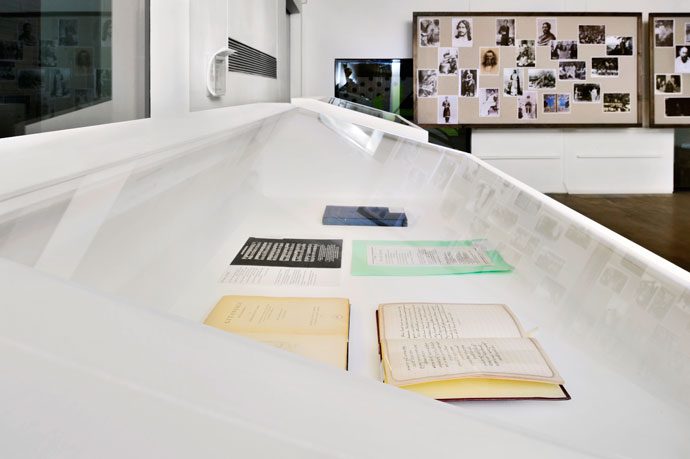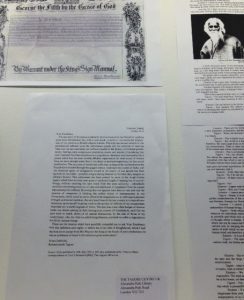by Paddy Chatterton, Iniva’s Head of Development
“The time has come when badges of honour make our shame glaring in their incongruous context of humiliation, and I for my part wish to stand, shorn of all special distinctions, by the side of my country men.”
So wrote Rabindranath Tagore in 1919 to Lord Chelmsford, Viceroy of India, as he explained his reasons for renouncing the knighthood that had been awarded him by Britain some 4 years earlier. The event that had spurred him to this decision was, by all accounts, a ruthlessly violent reaction by the British Army to a small uprising (Tagore refers to them as “local disturbances”) in the Punjab.
You can read the full letter as part of the special Tagore archive in the education space at Rivington Place for our current exhibition, Tagore’s Universal Allegories. It is without doubt one of the most beautiful, distraught, poetic and enraged texts I have ever read. Another example,

Tagore Centre UK Archive display
“the very least that I can do for my country is to take all consequences upon myself in giving voice to the protest of the millions of my countrymen, surprised into a dumb anguish of terror”.
One can only imagine how Lord Chelmsford felt when he read the letter. It would have taken someone with an insanely inflated sense of righteousness and patriotism not to have felt remorse.
The letter leads me to think about the choice people make to renounce or refuse knighthoods, CBEs and the like. Tagore was not the first person to hand back his knighthood but he was the first from Asia (and maybe the only?). Such a form of protest, particularly from someone from ‘the colonies’, would no doubt have been seen as a hugely significant event for its time.

Tagore Knighthood renunciation letter
In comparison, Danny Boyle recently indicated that he would refuse a knighthood in recognition of his role in the Olympics because it “just doesn’t feel right”- no particular reason, just would rather not. Over the years we have had a surprisingly large number of politicians, poets, philosophers and rock stars hand back their OBEs, MBEs and Sirhoods. John Lennon famously used the reason that his song Cold Turkey was falling down the charts. Dorris Lessing thought it a little too ironic to accept an honour from an institution she had spent her life attacking. David Bowie, French & Saunders, JG Ballard, L.S Lowry (wins the award for most honours turned down- 5 in total) – the list is almost endless…
What is surprising to me is how few of these people have declined or returned awards in direct response to a specific event or outrage. Most have taken the decision for very personal and practical reasons, rather than as a political act. Only a few have used renouncement as a form of specific political protest. Why should this be? We as a nation are not averse to making political statements and we are not so enthralled to the monarchy that we would not dare! Perhaps we believe that the act of accepting a knighthood in the first instance takes away the impact of then returning it; that the ‘badges of honour make our shame’ and we relinquish the right to criticise the establishment we so happily joined.
Either way, the more I read Tagore’s statement, the more I am affected by the outraged clarity of his argument. This is not a man choosing to respond; he is compelled to write his letter, unable to sanction any alternative. It is this that makes it so fascinating a text.
Exhibition Tagore’s Universal Allegories continues until 23 November 2013